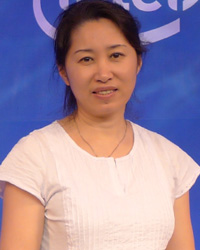This year is Zhang Hong's 24th working in China's consumer electronics industry.
In her hometown of Shenyang, in Liaoning province, she was very well known for being the first Sony Corp authorized Chinese distributor in the nation in the 1990s. She is now more famous in many countries for her new nickname - queen of the Chinese homemade yogurt machine.
Zhang was a technician at an electronic coach manufacturer from 1988. She then turned to distributing Sony consumer electronic products in 1995. In 2004, she started up her own business, Rikon Corp, making the yogurt machines. "In the 1990s, after we received China's first authorization from Sony, sales of electronic products were unbelievably good," Zhang said, "Our sales revenue reached 200 million yuan ($37.15 million) one year."
 |
|
Zhang?Hong, president of Rikon Corp |
However, because of increasing competition, the profit margin for selling overseas brands' products declined significantly so Zhang decided to head off in a new direction.
Looking back, Zhang feels she was very lucky in making the decision. According to US-based market research company NPD Group Inc, the sales revenue of all US -based home-appliance companies declined about 5 percent to $19.1 billion in 2011. Meanwhile, sales revenue for small kitchen appliances increased 2 percent.
Even some big multinational companies are shifting their emphasis to the small appliances industry now. Whirlpool's Chairman and Chief Executive Officer Jeff Fettig told The Wall Street Journal that his company's small electronic products sector grew more than 15 percent annually in the last few years, even during the financial crisis.
"In 2002, our first yogurt machine was launched and became very popular at the 2005 China Import and Export Fair in Guangzhou," Zhang told China Daily at Dell Inc's Women's Entrepreneur Network Forum held in late June. "However, we did not get any overseas orders at the three-day expo at all."
At first, Zhang didn't know why her company couldn't attract any overseas buyers. After consulting with the fair organizer, she realized that it was because exports need overseas product certifications from local authorities.
According to her research, back then yogurt machines had already been accepted by Western customers so her company did not need to nurture the market. Zhang decided to concentrate on overseas markets rather than the China market.
"Over the next two years, we applied for many countries' product certifications, including the United Kingdom, the United States, Australia and the Netherlands," Zhang said, adding that now Rikon receives more than $3 million in sales revenue from overseas markets annually.
This year she attended Dell's forum in India to seek business opportunities in the country. Zhang discussed with attendances from all over the world about how female entrepreneurs can expand their business globally.
According to report of the forum, three major barratries for female entrepreneurs are fund, social network and technology. In India, start-up company female entrepreneurs only get $9376 for starting their own business on average, said the report.
Technology is another issue that concerns Zhang and other women entrepreneurs.
"How to use new technology to increase our sales performance is our focus this years, Rikon will start to water test China's e-commerce market," Zhang said.
Because of the global economic recession, which started in 2008, her company's orders declined so she started to focus on Chinese customers.
According to London-based market intelligence firm Euromonitor International Ltd's data, households in China tend to have fewer than 10 small appliances such as coffee machines and microwave ovens, whereas Western nations have about 30 per family. Apart from microwave ovens and rice cookers, the market in China is less developed.
After building a factory neighboring Beijing with an annual production capacity of 1.5 million units in 2011, Zhang's next targets are opening an online store on Taobao, China's largest online market by sales, and making commercial yogurt machines.
"We have customized a type of yogurt machine specifically for Taobao customers and only sell it online to test the water," Zhang said.
To compete with other brands, Zhang also wants to enter the enterprise market and become a yogurt machine provider for restaurants and other organizations.
"Compared with traditional electronic products such as TV sets, refrigerators and washing machines, small appliances have a very noticeable advantage now," said China Electronic Chamber of Commerce Deputy General Secretary Lu Renbo. "The profit margin of small appliances is relatively high and can even be as much as 30 percent. The market has been growing very fast in recent years."
tuoyannan@chinadaily.com.cn
